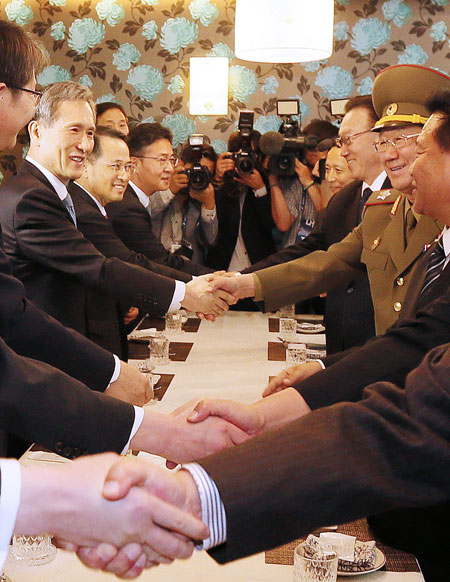- California Assembly OKs highest minimum wage in nation
- S. Korea unveils first graphic cigarette warnings
- US joins with South Korea, Japan in bid to deter North Korea
- LPGA golfer Chun In-gee finally back in action
- S. Korea won’t be top seed in final World Cup qualification round
- US men’s soccer misses 2nd straight Olympics
- US back on track in qualifying with 4-0 win over Guatemala
- High-intensity workout injuries spawn cottage industry
- CDC expands range of Zika mosquitoes into parts of Northeast
- Who knew? ‘The Walking Dead’ is helping families connect
N. Korea may make active peace gestures toward S. Korea

National Security Office chief Kim Kwan-jin, left, shakes hands with North Korea’s National Defense Commission Vice Chairman Hwang Pyong-so during the northern delegation’s visit to Incheon in Octover. Hwang was accompanied by Choe Ryong-hae, first on the right, and Kim Yang-gon, third on the right, both secretaries in the reclusive regime’s ruling Workers’ Party. (Yonhap)
SEOUL (Yonhap) — North Korea could launch a peace overture toward South Korea next year in a move to come out of diplomatic deadlock, while continuing its small-scale provocations, the Seoul government said Friday.
Inter-Korean relations have been at an impasse after the North refused to hold an agreed-upon second round of high-level talks in November, bashing Seoul for what it claimed were anti-Pyongyang campaigns. The breakdown dashed hopes for a thaw in the bilateral ties that were raised after senior officials from the two sides had a surprise meeting the previous month.
North Korea has further been isolated from the international community after the United Nations adopted a highly symbolic resolution on the North’s dire human rights situation last month, calling for the referral of its leader, Kim Jong-un, to the International Criminal Court.
“Chances are that North Korea could take the inter-Korean cooperation as a way out of its isolation should it fail to make progress in improving relations with major countries such as China, Russia and the United States,” South Korea’s Ministry of Unification said in a report analyzing the North Korean situation over the past three years under Kim’s control.
“The North could also make a proactive peace overture (toward the South) next year on the occasions of the 70th anniversary of the Korean Peninsula’s independence from Japanese colonial rule and the 15th anniversary of adopting the June 15 inter-Korean joint declaration that calls for exchange and cooperation betwen the two Koreas,” the ministry said.
Though the unruly regime is expected to continue its provocations by firing off missiles and violating the western sea border, it “would stop short of conducting another nuclear test,” according to the ministry, citing clear opposition from China and Russia as a reason.
The North has carried out three underground nuclear tests so far, with the latest one in February 2013, and has threatened to conduct “a new form” of detonation test.
In a move to solidify his grip on power, leader Kim is forecast to put more of his close aides in major posts, force high-ranking officials to pledge their loyalty to him by employing diverse measures, and strengthen ideological education, the ministry said.
“Kim Jong-un appears to wield practical power, but he has shown some limitations due to his lack of experience,” the ministry said. “In the long run, some divisive factors within the leadership could heighten risks to the regime.”
Kim, who is believed to be in his early 30s, took power in 2011 upon the death of his father, Kim Jong-il. To take control of the impoverished communist country, he has carried out a reign of terror, purging his uncle and the country’s No. 2 man, Jang Song-thaek, in December 2013.
















